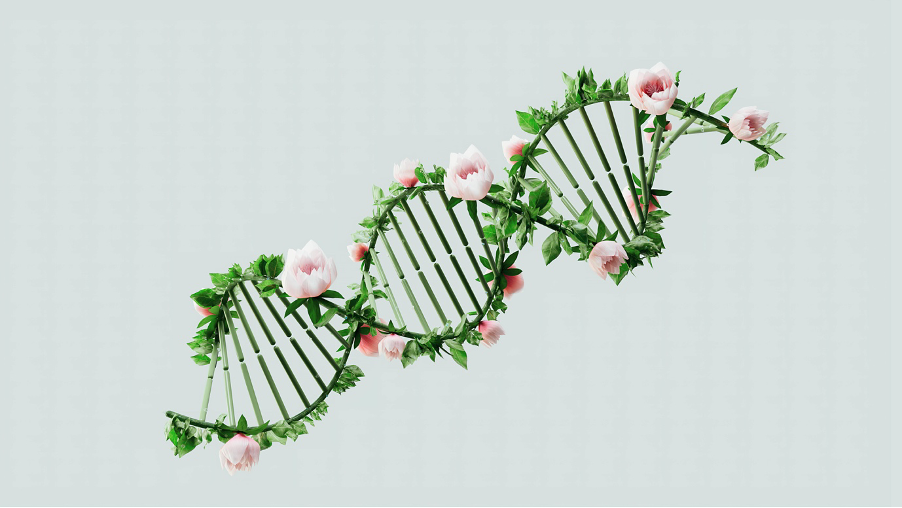How Your Genes Help You Make a Baby
What your genes are doing behind the scenes and how you can help them do their job.
In This Issue
How your genes work on conception and pregnancy
Why gene expression matters more than the gene itself
The roles of genes in sperm production, ovulation, implantation, placental development, and your baby’s brain
How gene variants (like MTHFR, SLC30A8, GSTM1) can affect fertility outcomes
What you can do, with or without testing, to support your genetic foundations
Beyond Eye Colour: What Most Genes Are Really Doing
When most people think of genes in the context of having a baby, they imagine inheritance. Will they get your straight black hair or your partner’s red locks? Your determination or their easy-going charm?
Some genes are indeed about traits. But most of them provide codes for jobs to be done: make and balance hormones, regulate inflammation, support detoxification and countless other biological processes, including the daily recreation of every cell and fibre of your being.
And the creation of a baby.
How Your Genes Drive Conception, Pregnancy, and Legacy
Your genes have a lot to get done in order to make a baby. Think of them as molecular project managers, overseeing the balance of hormones, the production of sperm, the release of the egg, the timing of ovulation, the preparation of the uterine lining and lots more. But they can’t do it alone.
They need the right tools: nutrient-dense food, a low-toxin environment, steady rhythms, restorative sleep. That’s your part of the arrangement.
So the question is more than: What genes will I pass on?
It’s: How are my genes working right now, and how do I help them along?
So let’s zoom out and see the kinds of things that come under their influence:
Conception
For women
Genes regulate hormone signalling, support egg maturation, coordinate ovulation, help maintain blood sugar balance, and prepare the uterine lining for implantation.
For men
Genes support sperm production, affecting count, shape, and motility, and influence the sperm’s ability to fertilise the egg.
Pregnancy
Once conception occurs, your genes continue working behind the scenes, forming the placenta, supporting immune tolerance, and managing nutrient delivery to your baby.
Legacy
Quite aside from inheriting traits, your genes can shape your baby’s long-term health.
They help lay the foundation for their immune system, metabolic health, brain development, and future resilience.
You & Your Baby Are More Than a DNA Blueprint
Your genes are hard wired, but how well the reproductive cycle works depends less on the genes themselves, and more on how well those genes are functioning.
That’s what we call gene expression. And you have an extraordinary ability to influence this.
When the conditions are right: nutrient-dense food, clean air and water, steady circadian rhythms, and a regulated nervous system, your genes do a stellar job. When they’re not, less so.
You’ve probably heard the phrase: genes load the gun, environment pulls the trigger.
Some genes are resilient. Others? More like hair triggers. They’re sensitive to stress, toxins, inflammation, or nutrient deficiencies. When the inputs are suboptimal, those more vulnerable pathways are the first to falter.
And we’re all different in that regard. Each of us carries a unique mix of gene variants, some offer built-in robustness, others need a little extra hand-holding.
You know that classic interview question: “So, what are your strengths and weaknesses?” You don’t hide the weak spots. You reframe them, explain how you manage them, how you turn them into strengths. Think of your genes in the same way.
So Let’s Help Your Genes Make a Baby
Your genes are constantly listening for signals. Food, environment, rhythm - all influence how they show up.
In my clinical practice, I focus on the preconception window. We work on metabolism, hormones, gut and microbiome, detoxification and creating a clear runway for egg and sperm to develop, and for conception to occur.
Knowing your unique DNA blueprint ties all of this together.
It helps guide how we personalise care, targeting what your body actually needs.
We also use functional labs, ranging from standard blood work to more advanced testing, to see how these genes are actually performing and guide where to focus.
This is precision medicine for the preconception window. And it does more than support conception. It sets the tone for pregnancy, postpartum recovery, and even your child’s long-term health.
Gene Variants & How You Can Influence Them
Here are a few examples of gene variants (small changes in a typical DNA sequence) that can influence your fertility:
MTHFR C677T or A1298C variants
Variants affects your ability to convert folate into its active form (5-MTHF), which plays a critical role in DNA synthesis, repair, and methylation - a process involved in gene regulation, hormone and neurotransmitter balance, and detoxification.
Why it matters:
Suboptimal folate metabolism can increase the risk of neural tube defects, early miscarriage, and implantation challenges. It can also affect egg quality, early fetal development, and even influence the baby’s brain development and long-term stress regulation.
This means:
We look closely at folate sources, using food-first strategies (e.g. leafy greens, legumes, organic liver) and supplementing with bioavailable forms like folinic acid or methylfolate when needed (which form is highly individual). We may also support related pathways using B12, riboflavin, choline, and betaine.
What you can do even without knowing your genes:
Focus on a daily intake of folate-rich foods like rocket/arugula, spinach, lentils, and asparagus. Avoid synthetic folic acid where possible and check both food and supplement labels. It may not be well converted by those with certain gene variants.
If you’re taking a prenatal, look for forms like folinic acid or methylfolate. Folinic acid is generally well tolerated, while responses to methylated folate (5-MTHF) can be highly individual. It’s best to speak with a practitioner before supplementing with methylated forms (which, by the way, can be a game changer for some).
SLC30A8 or IGF2BP2 variants
These genes are involved in insulin sensitivity and glucose metabolism. When certain variants are present, the body may struggle more with blood sugar regulation, especially under stress or with a high refined-carb diet.
Why it matters:
Impaired insulin function can disrupt ovulation, lower egg quality, and increase the risk of gestational diabetes. For men, it can influence sperm production and hormone balance.
This means:
Stabilising blood sugar through personalised nutrition (e.g. balancing carbs with protein and fat, lower-GI options), appropriate exercise, and possibly nutrients like magnesium, myo-inositol, or berberine depending on the picture.
What you can do even without knowing your genes:
Build your meals around blood sugar stability. Include fibrous, lower-carb vegetables, a source of protein, and healthy fats with every meal. Think eggs with avocado, or salmon with greens.
Avoid “naked carbs” like toast with jam or fruit on its own, which can cause blood sugar spikes. If you're curious, consider using a continuous glucose monitor (CGM) to gain real-time insight into how your body responds to different foods.
GSTM1 or GSTT1 deletion
Your body may be missing one of the key enzymes to neutralise oxidative stress (think: damaging free radicals) and process toxins. This isn’t uncommon, but it can leave you with fewer tools to handle environmental exposures, internal inflammation, or even everyday metabolic byproducts.
Why it matters:
Oxidative stress can damage developing sperm and eggs, interfere with implantation, and increase the risk of pregnancy complications.
This means:
We may prioritise antioxidant support, through food (like cruciferous vegetables, berries, spices), low-tox living, sauna, grounding and sometimes targeted supplementation (e.g. sulforaphane, NAC, or glutathione).
This is where “detox” becomes less about juice cleanses and more about helping your body do what it’s already trying to do.
When to Consider Genetic Testing
If you’re dealing with fertility challenges, endometriosis, PCOS, or broader health issues, genetic insights can highlight why your system may be more sensitive or less efficient.
But they’re just as valuable for anyone who wants to understand how their body works, and how to give their future baby the best possible start.
By understanding your genetic blueprint, we can personalise support to help:
Promote healthy egg and sperm development
Improve hormone and metabolic balance before and during pregnancy
Carry to full term
Reduce the risk of complications like gestational diabetes or pregnancy-related preeclampsia (high blood pressure)
Support optimal birth weight and growth for gestational age
Promote neurodevelopment and stress resilience in the baby
It’s also a test that only needs to be done once.
(And for clarity, this isn’t carrier screening or disease-risk prediction, which tests for inheritable conditions.)
Pin This Next to Your Prenatal
1. Genes don’t just determine traits, they run your body’s systems.
Most help regulate hormones, detoxification, metabolism, and inflammation - all crucial for conception and pregnancy.
2. Gene expression matters more than the genes themselves.
Your DNA is fixed, but how your genes behave can be improved with the right inputs: food, rhythm, sleep, stress reduction, and a low-tox environment.
3. Some genes are more sensitive to stress, toxins, or nutrient gaps.
Think of them like high-maintenance employees. They still get the job done, but do so much better if you give them the right tools and conditions.
4. You can support your body wisely even without a gene test.
Simple practices like eating leafy greens, stabilising blood sugar, and minimising toxins support even vulnerable pathways.
5. Genetic testing offers powerful precision.
If you're navigating fertility challenges, PCOS, endometriosis, or other health issues, DNA insights help identify where your system may need extra support, cutting down guesswork.
Warmly, Sonja
If this sparked something for you, tap 🧡 and hit Restack to pass it on.
Thanks for helping thoughtful fertility conversations travel further. 🤍
Curious to know more? Head to the About & Welcome pages for why I started Baby Ready Health and a bit about me.
Issues are free for now. If you're someone who likes to build things early, you can become a founding member. Or simply subscribe and follow along.
This post is for educational purposes only and is not medical advice. Always consult a qualified practitioner before making decisions about your health.
REFERENCES:
Chrysanthopoulos, I., Petsavas, A., Mavrogianni, D., Potiris, A., Machairiotis, N., Drakaki, E., Vrachnis, D., Machairoudias, P., Karampitsakos, T., Perros, P., Koratzanis, C., Drakakis, P., & Stavros, S. (2023). Detection of GSTM1-null Genotype in Women Undergoing IVF Treatment. Journal of Clinical Medicine, 12. https://doi.org/10.3390/jcm12237269.
Ray, G., Zeng, Q., Kusi, P., Zhang, H., Shao, T., Yang, T., Wei, Y., Li, M., Che, X., & Guo, R. (2024). Genetic and inflammatory factors underlying gestational diabetes mellitus: a review. Frontiers in Endocrinology, 15. https://doi.org/10.3389/fendo.2024.1399694.
Vandana, R., & Pradeep, K. (2025). Detrimental Effects of Methylenetetrahydrofolate Reductase (MTHFR) Gene Polymorphism on Human Reproductive Health: A Review. Clinical Journal of Obstetrics and Gynecology. https://doi.org/10.29328/journal.cjog.1001182.
Zhang, T., Zhang, S., Zhang, C., Liu, H., Liu, M., Zhang, G., Duan, G., Chen, S., & Ren, J. (2024). The moderation effect of GSTM1/GSTT1 gene polymorphisms on the association of sperm mitochondrial DNA copy number and sperm mobility. Scientific Reports, 14. https://doi.org/10.1038/s41598-024-74968-3.





Me and my wife are trying to have a child so this was a helpful read. Thank you 🙏🏼
Great read!